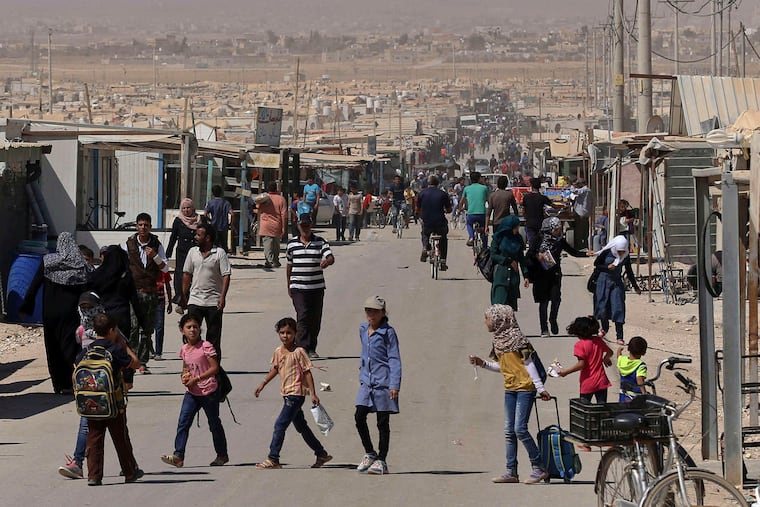Focus on barring Syrian refugees ignores real threat from ISIS
Marisa Porges recently left the White House, where she handled cybersecurity policy for the National Economic Council; she formerly served as a counterterrorism policy adviser in the Departments of Defense and Treasury

Marisa Porges
recently left the White House, where she handled cybersecurity policy for the National Economic Council; she formerly served as a counterterrorism policy adviser in the Departments of Defense and Treasury
It's been one week since the Paris attacks, and with each day's reports of more manhunts and raids, we've received new data points about the terrorist threat at hand - tidbits about how the Islamic State recruits Westerners, about how these radicalized individuals travel to Syria to fight and train, and about those who return home to help ISIS target Western cities. Such stories underscore the serious threat the Islamic State poses to the United States and Western Europe.
But what has me most concerned? It's not intelligence that accentuates the Islamic State's growing capabilities. Nor reports of the terrorist group's threats against Washington and New York City. Rather, it's the fact that the public debate is so focused on the perceived "threat" of Syrian refugees that we aren't addressing the issues that matter most for our long-term security - namely, problems of terrorist radicalization and recruitment, the Islamic State's operational capacity, and community resilience.
This focus on the Syrian refugee population is a serious - perhaps fatal - misdiagnosis of the current terrorist threat. To start, none of the attackers involved in the Paris attacks, and none of the collaborators captured to date, appear to have been refugees. Those identified thus far were all French and Belgian citizens, men (and one woman) who appear to have been recruited by ISIS from a distance, either online or via associates in their home countries. And at least six of whom appear to have traveled to and from Syria to train and fight alongside ISIS.
Reports of a stolen Syrian passport found on one attacker are also misleading. The passport itself was fake and, given the European Union's Schengen Agreement rules, could have easily been replaced by another form of forged identity readily available on the black market.
What's more, the process by which Syrian refugees are screened for entry to the United States is extremely rigorous - and includes significant investigation into their potential involvement with or allegiance to terrorist groups. In fact, one reason so few Syrian refugees have come to America - since 2011, only 2,184 refugees have resettled here - is because the process is so long and arduous, taking up to two years or more, and requiring extensive background checks. Foreign fighters are highly unlikely to use the refugee resettlement process to reenter their home country. They are more likely to return home using their own passport or forged documents for a group not under such immense scrutiny.
Moreover, the focus on blocking efforts to resettle a small number of the hundreds of thousands of Syrians displaced by the war - including time spent passing the House's imprudent American Security Against Foreign Enemies Act - diverts much-needed attention to what really needs our focus moving forward: namely, how to stop the Islamic State from recruiting Westerners to its cause - and how to thwart those who, once radicalized, travel to Syria to receive training and fight alongside ISIS, and may eventually return home to foment insecurity.
Indeed, our energy - and that of our politicians and policymakers - is best spent discussing how we can better track so-called homegrown terrorists, whom ISIS is radicalizing from afar, and what safeguards will really protect us against foreign fighters returning home. And to consider how we can improve community-led counter-radicalization efforts, including by embracing Syrian refugees as a part of these programs moving forward.
This is where the real challenge lies. And the fact that we are so quick to define Syrian refugees as a problem - even a threat - means that we are missing the great potential they offer to support our efforts to counter Islamic State radicalization.
I saw this firsthand when, a year and a half ago, I sat with Syrian refugees at the Za'atari refugee camp in Jordan, discussing the violence and destruction they believed were caused by both Syrian President Bashar al-Assad and Daesh, the Arabic name for ISIS. As one father told me, "We hope all powers will help us get rid of them." Indeed, the refugees I met were firmly opposed to ISIS.
Through this lens, we can see that resettling these refugees will directly undermine the "Islam vs. the West" narrative promoted by the Islamic State - and a key tenet of their radicalization rhetoric. And we will be better armed to counter the real threat here at home, those within our borders who are vulnerable to Islamic State propaganda and being radicalized.
It's time to focus on the real threat. Not the Syrians who are fleeing war and oppression, but the misguided few who succumb to the Islamic State's twisted appeals.